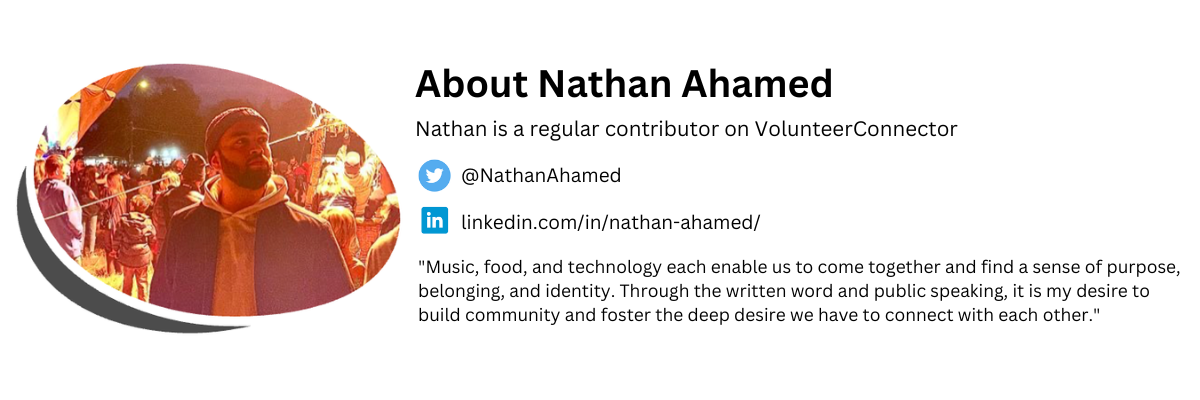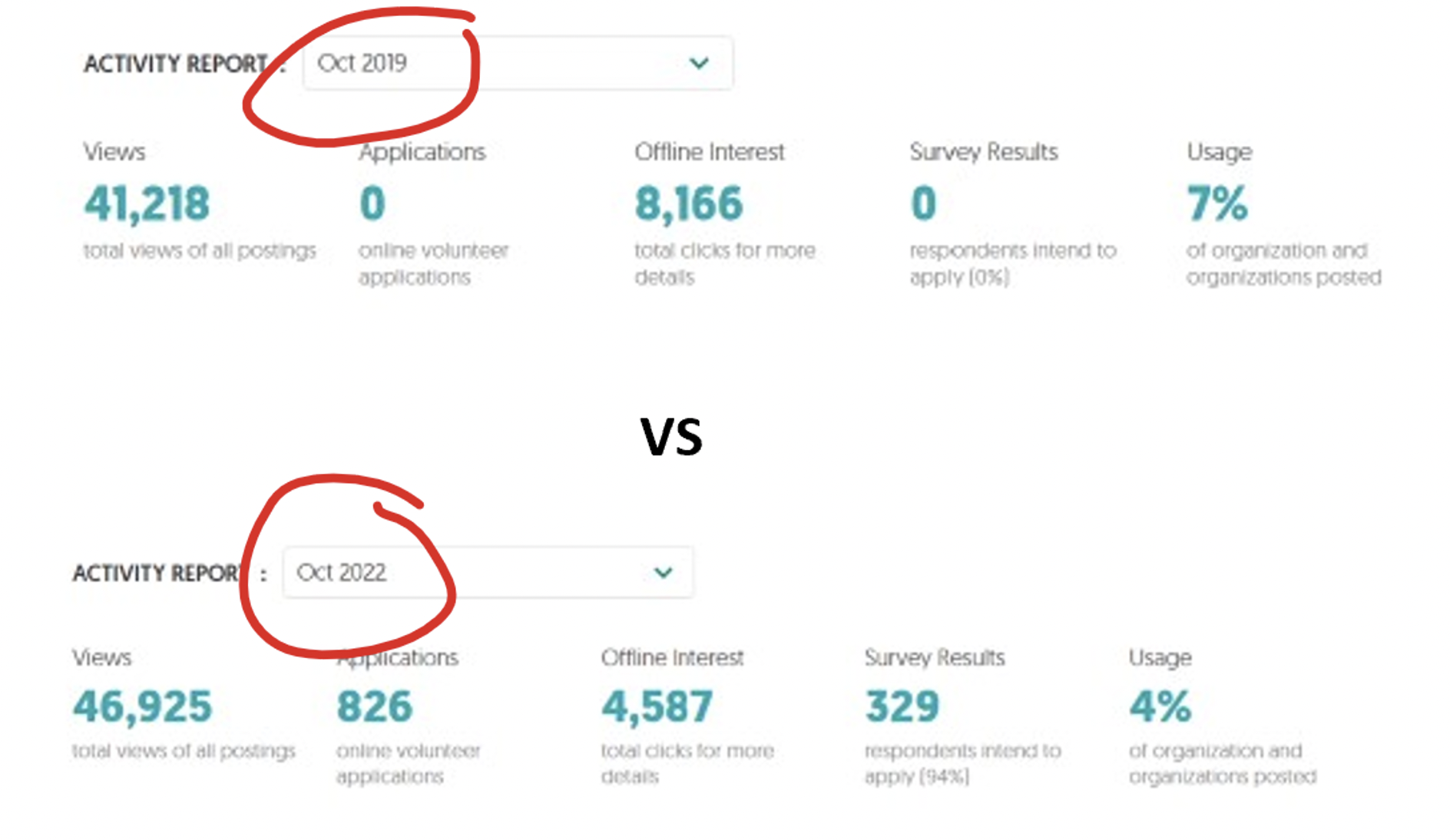Strategies for inclusion and empowerment
It’s important to shape and equip volunteer-driven organizations and campaigns to serve diverse communities. To do this, organizations must commit to concrete actions that address structural and systemic racism and a lack of representation among volunteers. Dismantling racism takes more than words, thoughts, and prayers. True transformation in volunteering requires a commitment to address the structural and systemic barriers perpetuated by racism.
Data on diversity and racialized communities
 Data and research, or the absence of it, are often cited as reasons not to act. There is a glaring need for more data surrounding racialized communities. The deliberate lack of data collection, or the weaponization of data (Milner & Traub 2021), have been tools for perpetuating racism in racialized communities. As Mutamba and Rock (2022) note, “A larger and disaggregated data set will give us better insight into the experiences of racism and colonization in the volunteer sector.” While there is a great deal of learning ahead regarding the challenges and barriers faced by Black, Indigenous, and People of Colour (BIPOC), we must forge ahead, and use the information we have available to take steps toward anti-racism today.
Data and research, or the absence of it, are often cited as reasons not to act. There is a glaring need for more data surrounding racialized communities. The deliberate lack of data collection, or the weaponization of data (Milner & Traub 2021), have been tools for perpetuating racism in racialized communities. As Mutamba and Rock (2022) note, “A larger and disaggregated data set will give us better insight into the experiences of racism and colonization in the volunteer sector.” While there is a great deal of learning ahead regarding the challenges and barriers faced by Black, Indigenous, and People of Colour (BIPOC), we must forge ahead, and use the information we have available to take steps toward anti-racism today.
Diversity and representation as a starting point
A simple way to begin is by researching the demographics of the communities you serve. You can then take steps to mirror them in your organization's diversity. Information on diversity within communities is available from the Government of Canada (2022). Take time to investigate and understand the immediate needs in those communities. Different municipalities like the City of Calgary (2022) have outlined community needs and made this information publicly available. Develop an understanding of how the needs of a community and the demographics of racialized individuals within that community are often correlated. This will provide a framework to understand whom you are serving, ways in which you can ensure their voices are heard, and how best to serve the needs of a community.
Four keys to adopting an anti-racist approach to volunteering
Education and implementation are important when developing an anti-racist approach to volunteering. The journey towards anti-racism is a cultural shift. This requires an understanding of what equity, diversity, and inclusion mean. It is important to acknowledge how each individual may contribute to racism and how our systems and structures perpetuate racism and inequality. This will inform you how to change your organization's approach to volunteering. Here are four keys you can focus on to start on the right path.
Move away from a colourblind approach
Historically, to promote equality, harmful and reductive “colourblind” practices were developed around the inclusion of racialized individuals. “Not seeing colour” has the opposite effect regarding inclusion. It fails to acknowledge the individual by not understanding their unique and intersecting identities, experiences, or trauma. Further, “[diversity and inclusion] is more complex than just numbers. Simply adding more ‘colour’, does not create inclusive cultures in which BIPOC people can be authentic and thrive” (Roche & Passmore 2022). To empower any volunteer, regardless of race, it’s important to shift from a colourblind approach and acknowledge the unique identities of every individual.
Research intercultural definitions of volunteering
The more you develop an intercultural understanding of what volunteering means, the more you can have an impact in serving diverse communities. In his book Perspectives on Volunteering, Mario Roitters outlines the importance of understanding how different cultures perceive what it means to volunteer. An excerpt from the chapter on volunteerism in Latin cultures sheds light on the cultural differences that exist surrounding volunteering, “In Latin America, the problem lies in the fact that a certain number of these types of actions performed are considered merely good manners. Such actions rarely evoke the notion of volunteerism, as they do in the context of developed countries. Therefore, a voluntary act differs from one cultural context to another.” (M. Roitters 2017). Understanding these cultural differences will set your organization up for success in recruiting and retaining diverse volunteers.
Understand the barriers encountered by BIPOC volunteers
It's important to understand your volunteers' cultural and racial identities, the situations they are stepping into, and the communities they are trying to serve. This will allow you to navigate the risks of harmful and triggering situations. As Mutamba and Rock (2022) observe, “People across racial identities experience barriers to volunteering. BIPOC participants reported facing more barriers across every single category. There is not a single step in the volunteer screening practice that does not impose significant barriers for BIPOC participants.” In their study, Mutamba and Rock list several barriers, including police checks, access to first aid training, and owning a personal vehicle. Studies have shown that race and poverty often intersect to prevent social integration[NA1] (Lin and Harris 2009). When we talk about seeing colour and understanding racial trauma, it is important to consider how your organization can help address these obstacles or explore alternatives that acknowledge the barriers racialized volunteers often face.
Develop anti-racist volunteer strategies through collaboration
Partner with BIPOC individuals within your organization. Empower them by inviting them to lead the change, yet be mindful of how it may contribute to their overall responsibilities and workload. Respect the choice of racialized individuals to abstain from driving this work. Offer education on topics surrounding racism, making sure to create a safe space for discussion. “The cornerstone for a productive and respectful conversation on racism or other related issues is centered on ensuring the psychological safety of everyone who is part of the conversation.” (Canadian Centre for Diversity and Inclusion 2020). Awareness is grown through workshops, guest speakers, and BIPOC-written educational material.
Find local BIPOC-led organizations and learn from them, ensuring fair compensation. If your goal is to understand racialized communities and adopt strategies to better partner with and serve them, try to engage organizations already doing this work. Racialized individuals have been serving their communities for a long time. Partner with them, learn from them, and support the work they are already doing.
Set yourself up for success
The more you understand the complexities of racial identity and trauma in light of structural and systemic racism, the more you can equip your organization to take an anti-racist approach in volunteering. The success of any organization striving to take an anti-racist approach in volunteering will depend on how well it educates those in the organization, seeks out representation, and empowers BIPOC individuals to help drive change.

 We continue to hear from organizations across the country that it is harder to find volunteers than ever before. However, as you can see from the image volunteerconnector.org continues to see growth in volunteer traffic.
We continue to hear from organizations across the country that it is harder to find volunteers than ever before. However, as you can see from the image volunteerconnector.org continues to see growth in volunteer traffic.
 Data and research, or the absence of it, are often cited as reasons not to act. There is a glaring need for more data surrounding racialized communities. The deliberate lack of data collection, or the weaponization of data (Milner & Traub 2021), have been tools for perpetuating racism in racialized communities. As Mutamba and Rock (2022) note, “A larger and disaggregated data set will give us better insight into the experiences of racism and colonization in the volunteer sector.” While there is a great deal of learning ahead regarding the challenges and barriers faced by Black, Indigenous, and People of Colour (BIPOC), we must forge ahead, and use the information we have available to take steps toward anti-racism today.
Data and research, or the absence of it, are often cited as reasons not to act. There is a glaring need for more data surrounding racialized communities. The deliberate lack of data collection, or the weaponization of data (Milner & Traub 2021), have been tools for perpetuating racism in racialized communities. As Mutamba and Rock (2022) note, “A larger and disaggregated data set will give us better insight into the experiences of racism and colonization in the volunteer sector.” While there is a great deal of learning ahead regarding the challenges and barriers faced by Black, Indigenous, and People of Colour (BIPOC), we must forge ahead, and use the information we have available to take steps toward anti-racism today.
 There are new opportunities posted on VolunteerConnector every single day! If you are not seeing something that resonates with you check back the next day and no doubt something will be there that makes you excited to give your time. We occasionally feature here on the blog opportunities that we find interesting. Here are a couple that are fascinating us this week!
There are new opportunities posted on VolunteerConnector every single day! If you are not seeing something that resonates with you check back the next day and no doubt something will be there that makes you excited to give your time. We occasionally feature here on the blog opportunities that we find interesting. Here are a couple that are fascinating us this week!

